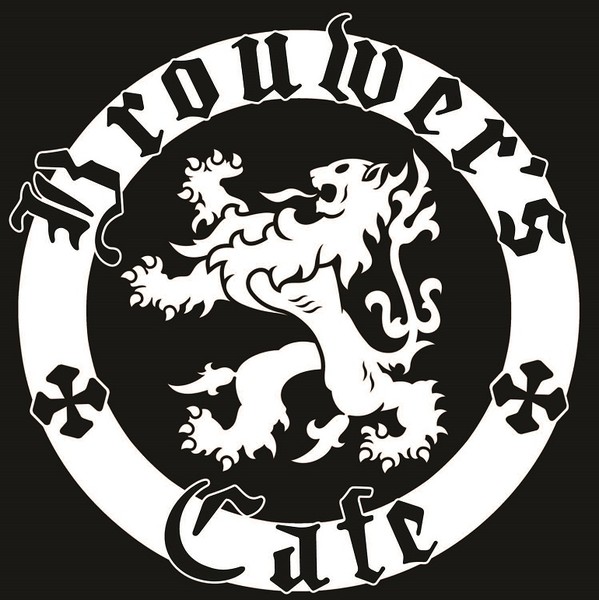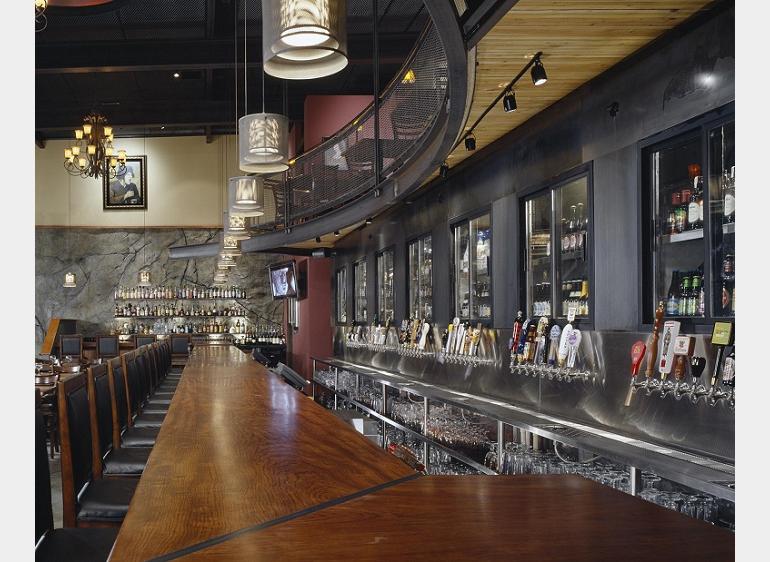Start 14-Day Trial Subscription
*No credit card required

Brouwer's Café
To the uninitiated, it might not be easy to spot Brouwer’s Café. Its presence in the Fremont neighborhood of Seattle is only marked over the front door with a metal Leo Belgicus, the lion depicted on Belgium’s coat of arms. But that sign is just about all that is subtle about Brouwer’s Café.
Take one step inside the dark entryway and you are transported to Brussels; there is even a replica of the landmark Manneken Pis fountain (Dutch for “little man urinating”) to greet you as you enter. A few more steps inside and the space opens up, with a bar that runs nearly the length of the room on the far wall, cozy booths on the other side, a second bar devoted to single malt Scotches in the back and tables scattered throughout. A staircase near the Scotch bar takes you up to a second level loft, with extra table seating. Skylights fill the room with natural light, giving it an airy atmosphere, even on a drizzly Seattle day.
The owners, Matt Bonney and Matt Vandenberghe, met while working at the local Maritime Pacific Brewing Company. A dozen years ago, their first business venture together was the well-respected beer store, Bottleworks, situated not far from Brouwer’s Café, which opened in 2005.
“Because of the success of Bottleworks, we knew we had to go big,” Bonney said, adding that he and Vandenberghe’s main goal for Brouwer’s Café was to create the ultimate beer mecca to showcase the relationship between well-crafted beer and well-prepared food.
“There are a lot of great restaurants, but few offer great beer,” said Bonney, who calls himself the “vision protector” of the duo. “We showcase artisan beer to be enjoyed with well-prepared, higher-end food.
“It’s been difficult raising customers expectations above the usual pub grub, but the clientele has begun to shift to people who want a good food and good beer experience.”
The menu features Belgian specialties like pommes frites with several choices of dipping sauces, such as curry ketchup, both regular and chipotle mayonnaise, and remoulade; Kaas croquettes, a deep-fried Gruyere cheese batter hand-coated in panko bread crumbs; and, of course, steak and frites and several versions of mussels and frites. A daily fresh sheet announces rotating charcuterie and vegetarian, seafood and dessert specials.
Beer education is another main focus at the restaurant, and servers are expected to fuel their passion for beer with knowledge so they can help customers find the perfect beer from the 62 taps and the extensive collection of bottled beers. To help the staff continue their education, Bonney gives monthly beer tests, take-home quizzes designed to inspire servers to investigate the answers if they don’t know them. Example question: “Name the beers currently at Brouwer’s that blend both ale and lager yeasts.” The servers say they like the beer-school experience because it helps them please their customers and keeps them on top of all the beers that come into Brouwer’s Café, as the rotating taps change often.
 Servers are also trained on and expected to implement the in-house procedure for serving a proper beer at Brouwer’s. No matter how busy the place is, each beer, whether it is served in a tulip glass or a pint glass, gets the following treatment before it reaches its thirsty recipient: After the order is placed, the proper glass for the beer is selected. The glass gets a shower at one of several “rinser” stations that shoots water into the vessel.
Servers are also trained on and expected to implement the in-house procedure for serving a proper beer at Brouwer’s. No matter how busy the place is, each beer, whether it is served in a tulip glass or a pint glass, gets the following treatment before it reaches its thirsty recipient: After the order is placed, the proper glass for the beer is selected. The glass gets a shower at one of several “rinser” stations that shoots water into the vessel.
“This removes any impurities in the glass and softens the glass to prevent it from agitating the beer,” Bonney said.
The beer is poured with a big, frothy head that is then shaved off with a blunt knife so it is flush with the rim of the glass. Next it is taken to one of several “dip wells” – shallow sinks filled with clean water – where the glass is submerged near the rim to remove any residual beer from its sides. Finally, the beer is then presented to the customer for his or her enjoyment.
While the ritual is showy, it isn’t about presentation, and the same sharp attention to detail is also evident behind the scenes at Brouwer’s. On the other side of the wall of taps, a large cooler holds the kegs, which are organized so that the shortest line possible reaches to the tap.
“Tap lines are no longer than eight feet,” Bonney said. “And we don’t ever clean our tap lines.” Knowing the statement would cause a raised eyebrow, Bonney waited to deliver the rest of the story.
“We cut new lines and replace them every time,” he said with a smirk. “Whenever a keg runs out, whenever a keg would customarily be scheduled to have its tap lines cleaned, we simply cut off another length of line from a big roll we have in the cooler and replace it. This guarantees that the beer going through that line is the only beer going through that line and is the cleanest and freshest it can be.” Bonney added that the old lines are recycled, so there is no waste.
The “taps side” of the cooler is controlled to maintain a serving temperature of 42 degrees, which Bonney said is ideal for most of the beers. That side of the cooler also holds the large selection of bottled beers that are available at Brouwer’s, an impressive lineup of craft beers from around the world.
The other half of the cooler holds the temperature at 52 degrees. This is the cellar area, and walking among the rows of kegs and cases of bottles, including some beers brewed especially for the bar, is like walking down a beery version of the forecourt at the Grauman’s Chinese Theatre in Hollywood. Over there are cases of Cantillon and St. Bernardus. One shelf holds several vintages of Dupont Avec les Bons Voeux. Scattered everywhere are bottles and kegs of craft beer from across the United States, plus a handful of unrecognizable little wooden barrels and kegs with hand-lettered notes that describe the rare nectar within. It’s a chilly who’s who of great beer from around the corner and around the world, just waiting for that perfect moment to be tapped.
To some, the entire Brouwer’s Café experience might seem over-the-top, but that’s not the case for Bonney, who argues that wine has received a similar level of respect and care for decades.
“It’s all about representing the beer the best we can,” he said, before turning away to fill a request for an Elysian MonoBrouwer IPA, brewed specially for the establishment’s five-year anniversary.
“It’s as simple as that.”



